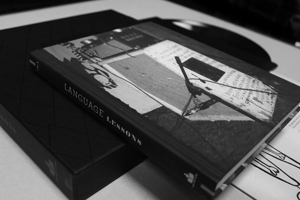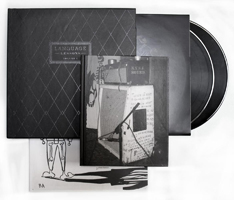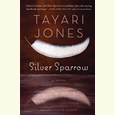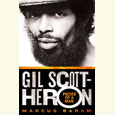Long Player
Sparks fly from poetry, prose, art, and music in Language Lessons, the first title released by Nashville’s Third Man Books
In the preface to Language Lessons: Volume 1, co-editor Chet Weise describes the Nashville-based reading series, Poetry Sucks!, that served as the inspiration for this new collection of poetry and prose: “A reading series that would usually be curated, but sometimes be open mic, and would always showcase all types of language: poetry, prose, art, music, spoken word, comedy, a few instances of heckling, a thrown beer bottle.”
 Weise and co-editor Ben Swank have applied that same inclusive view of human communication to Language Lessons, a collection that is at once a book, an art exhibit, and a recorded sound package. Housed in a large box, the anthology includes a hardcover book, five broadside art prints, and a two-LP set of music and spoken-word pieces. Rather than simply compiling an archive of the writing, art, and music from the Poetry Sucks! events, Weise and Swank have made some interesting choices about content, design, and presentation in their effort to duplicate the synergy of a live event in an analog medium.
Weise and co-editor Ben Swank have applied that same inclusive view of human communication to Language Lessons, a collection that is at once a book, an art exhibit, and a recorded sound package. Housed in a large box, the anthology includes a hardcover book, five broadside art prints, and a two-LP set of music and spoken-word pieces. Rather than simply compiling an archive of the writing, art, and music from the Poetry Sucks! events, Weise and Swank have made some interesting choices about content, design, and presentation in their effort to duplicate the synergy of a live event in an analog medium.
Language Lessons includes work by more than fifty writers, artists, and musicians. For the literary portion of the anthology, poetry from a large variety of contemporary writers comprises the lion’s share of material, alongside a small selection of both fiction and nonfiction. The gamut of authors includes both prominent and accomplished writers, including Pulitzer Prize and National Book Award nominees Adrian Matejka, Dale Ray Phillips, and C.D. Wright, as well as writers at the beginning of their careers. The LPs include spoken-word recordings from authors in the printed portion, plus jazz, psychedelic-punk, electric blues, and power pop from Vox Arcana, William Tyler, Jem Cohen, Mystery Twins, Paul “Wine” Jones, JP5, Carlton Melton, and Destruction Unit.
Because of the variety of material included here, readers are sure to find their own favorites. Outstanding examples include poems by Jake Adam York, Sampson Starkweather, Larry O. Dean, Nicky Beer, besmilr brigham, Joshua Gillis, Wayne Miller, and Weise himself. Notable prose selections include a beautiful short story of Southern-fried magic realism by Pinckney Benedict and a fascinating excerpt from musician Tav Falco’s unconventional, third-person autobiography, Ghosts Behind the Sun: Splendor, Enigma & Death.
 Beyond the printed words of Language Lessons, the overall presentation places the poems, prose, and music into a larger context. As the first publication by Third Man Books, the format of Language Lessons draws from the same philosophy espoused by the publisher’s parent company, Third Man Records. Founded in 2001 by Ben Swank and rock star Jack White, Third Man Records has been at the forefront of the vinyl revival, emphasizing the human value of interacting with music on a physical level through the traditional analog formats of phonograph records. The company emphasizes artwork, creative package design, and other elements that are becoming lost art forms in a digital age.
Beyond the printed words of Language Lessons, the overall presentation places the poems, prose, and music into a larger context. As the first publication by Third Man Books, the format of Language Lessons draws from the same philosophy espoused by the publisher’s parent company, Third Man Records. Founded in 2001 by Ben Swank and rock star Jack White, Third Man Records has been at the forefront of the vinyl revival, emphasizing the human value of interacting with music on a physical level through the traditional analog formats of phonograph records. The company emphasizes artwork, creative package design, and other elements that are becoming lost art forms in a digital age.
In Language Lessons, this philosophy is embodied in the front cover of the book portion: a photograph of a battered guitar amplifier sitting onstage with a quotation from William Faulkner’s The Wild Palms—“If I Forget Thee, Jerusalem”—crudely scrawled on its side. Words take on meaning in part because of their context. Faulkner’s words from 1939 are no different today than they were when he wrote them, but presented in this physical context they seem markedly different. So it is with this anthology: thanks to the font and page design used in a printed volume, the very act of holding a physical book in one’s hands involves a different form of language than when those same words are reduced to pure text on an iPad or Kindle. And just as live readings of material can give poetry and prose a different context and impact, the design and presentation choices of Language Lessons are an integral part of the total experience.
Language Lessons succeeds in presenting a variety of work that generates sparks as the poetry, prose, art, and music rub against each other in one package. Perhaps the best description of the total effect can be found in the short excerpt from musician and novelist Richard Hell’s 2013 autobiography, I Dreamed I Was A Very Clean Tramp, included in the book portion of Language Lessons. Writing about the early rehearsals of the seminal New York proto-punk band Television, Hell writes that truth “was the hilarious, incomparable intoxication of materializing into being these previously nonexistent patterns of sound and meaning and physical motion. It was as fraught and sublime as great Renaissance religious painting.”
That heady excitement is the heart of great live events where an atmosphere of creativity lies heavy, no matter what the medium, and it is also contained within the pages, illustrations, and grooves of Language Lessons: Volume One.

Randy Fox is a freelance writer whose writing on music and pop culture has appeared in Vintage Rock, Record Collector, East Nashvillian, Nashville Scene, Jack Kirby Collector, Hardboiled, and many other publications. He lives in Nashville.


